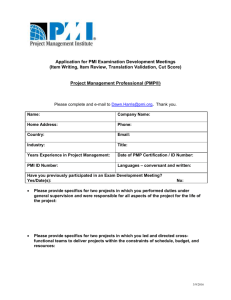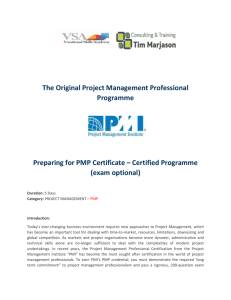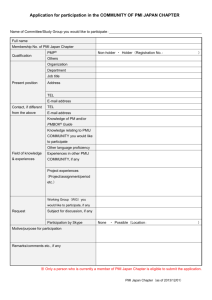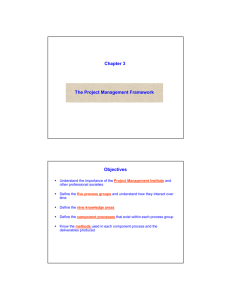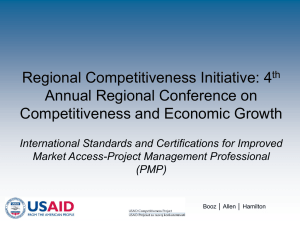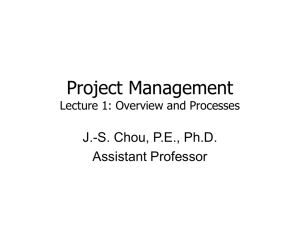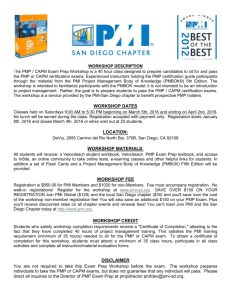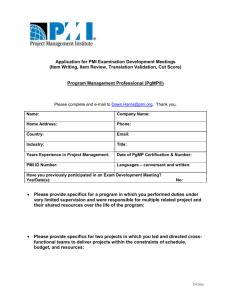PMI Presentation Cover Slide Title space
advertisement
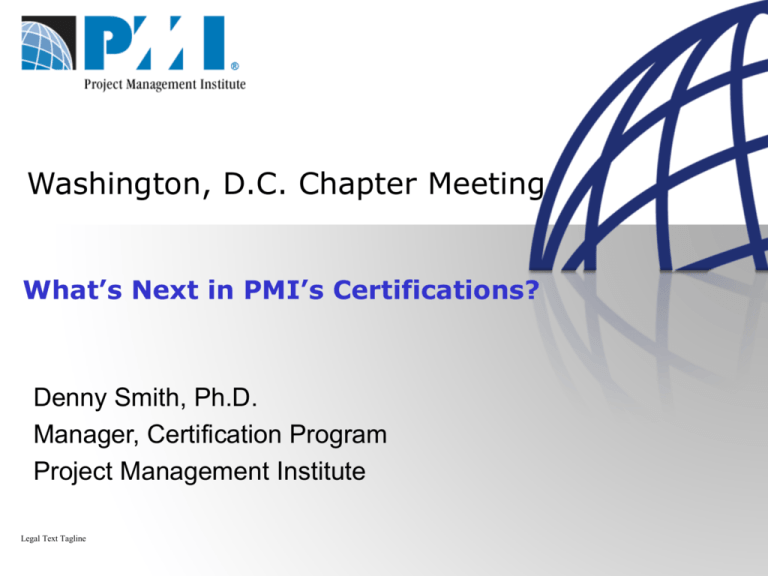
Washington, D.C. Chapter Meeting What’s Next in PMI’s Certifications? Denny Smith, Ph.D. Manager, Certification Program Project Management Institute Legal Text Tagline Topics To Cover Today New PMP ® Examination Timeline PMP® Examination Specification Importance of the PMP Credential CAPM® Credential Global Policies and Practices Global Examination Development Process Continuous Improvements Certification Governance Demand for Professional PMs PMI’s Organizational Focus & Credentials New PMP Examination Timeline Countdown to New PMP Examination PMI Today Important Dates • • 24 September last day to take current (2004) examination 30 September new (2005) exam is deployed • Globally at Prometric Test Centers • 10 Language aids offered • Application deadlines • 29 August last day to apply to take 2004 exam • 1 September candidates began applying to take 2005 examination • Retakes • 2004 exam offered to unsuccessful candidates Why change exam specifications and how often? • • • Common credentialing process Updated to reflect changes in profession Every 4-5 years PMP Examination Specification First-ever Regional Study 5 regional focus groups held to gather information North America Asia Pacific EMEA Latin America Summary Meeting Web-based survey instrument developed and launched globally to validate regional findings Resulted in PMP Examination Specification: a global certification standard that is the basis for the revised exam New exam questions developed based on current PM reference texts and mapped to ensure sufficient questions to assure candidate knowledgeable in areas identified as necessary for PMPs Available to purchase from PMI’s Bookstore PMP Examination Specification Global Certification Standard Why create an examination specification? • Provides percent of questions/domain on exam • Used by trainers to guide instructional design • Used by students to guide their studies • Critical to ensure exam valid have content validity • Content validity – does the exam evaluate the knowledge or skill required to function as a practitioner in the field? Examination Specification • Resulted from market research project • Establishes the blueprint for exam construction • Identify domains, tasks, knowledge and skills • Use psychometrically-sound methodologies PMP Examination Specification Examination Blueprint Domain Percent of Questions Initiating 11 Planning 23 Executing 27 Monitoring and Controlling 21 Closing 9 Professional and Social Responsibility 9 Importance of PMP Credential Why Individuals and Organizations Pursue Fortune Article PMI Salary Survey Data Top 10 Hottest Certifications Corporate endorsements Support organization’s professional development activities Benefits • On personal and professional level • Globally recognized • Global transferability across countries and industries • “PMP preferred/required” increasing in advertisements Interest in the PMP PMP Growth Since 1984 140,000 130,000 Total PMPs 120,000 100,000 100,000 75,000 80,000 60,000 53,000 40,343 40,000 27,052 18,184 20,000 0 40 67 102 10,000 4,769 5,294 6,397 1984 1985 1986 1995 1996 1997 1998 1999 2000 2001 2002 2003 2004 2005 Certified Associate in Project Management (CAPM®) New Opportunities Recently revised and repositioned based on market research New target markets • Project team members interested in doing their project work more effectively and efficiently • New project management practitioners • Students interested in project management and want credential to improve resume Eligibility requirements • High school diploma or global equivalent • 1,500 hours experience on a project team OR • 23 Contact hours of project management education Certified Associate in Project Management (CAPM®) Solely testing on PMBOK® Guide – Third Edition Retest every 5 years on new material to maintain credential Building business case to justify translations Collateral Material Global Policies and Practices Standards for credentialing practice PMI’s credentialing practices aligned with industry testing standards • PMI is a member of the National Organization for Competency Assurance (NOCA) Establishes standards for best practices in certification programs Encourages separation of exam development and delivery from exam preparatory training • Standards for Educational and Psychological Testing published by: American Education Research Association American Psychological Association National Council on Measurement in Education Ensures credentialing decisions are sound • Validity: Does the credentialing process really assess what it is intended to? • Reliability: Is the decision to certify someone consistently applied globally? Global Policies and Practices ISO Global Accreditation ISO 9001 accredited • Certification Department - first of its kind to be accredited • Successfully passed routine audit Q4’04 Approached by member of ISO to pilot ISO 17024 How’d They Do That? Global Examination Development Process Best Practice Approach 1 2 Market Research 4 7 Pretesting of Test Items Passing Point Development of a Test Blueprint 5 8 Examination Assembly Test Administration 3 Item Development and Validation 6 9 Review and Revision Psychometric Analysis Item Development and Validation PMI Considered Global Leader in Field Exam questions developed by credentialed persons around globe • PMP - by groups of PMPs • CAPM - by groups of Project Management Practitioners Questions independently validated • Referenced to current project management textbook sources • Larger than PMBOK® Guide – Third Edition; based on PMBOK® • Satisfy all the test specifications of a job analysis Pretesting Solid Examination Development Number of examination questions “pretested” to gain item performance statistics • 25 PMP • 15 CAPM Certification/licensure standard practice Process ensures: • Sound statistical performance of questions; • Item discrimination • Item difficulty • Multiple forms of the test equated; and • Validity and reliability of item bank questions Enhances meaning and value of credential Determine Passing Point Integral Part of PMI’s Examination Development Important step in exam development process Modified Angoff technique – certification industry standard • Legally defensible Psychometrician facilitates certificants (PMPs, CAPMs) through process Each question evaluated by multiple persons Test Administration Audit and Test Format Prior to testing • Enhanced audit process in place with plans for increase • 10% of all applicants currently pulled for audit Testing • Candidates can test in computer-based facilities around the world • Paper and pencil administrations available for those not near CBT or for group administrations • Significant number of CBT and PBT recently added to meet increasing interest in PMI certification • Rigorous security at exam site to ensure candidate authenticity and fair test taking in place Maintenance of Examinations Psychometric Analyses Item analysis reports • Statistical reviews of performance of questions • Numbers of responses to each distractor (a, b, c, d) • Difficulty level of questions • Discrimination indices of questions Item review meetings • PMPs • Use information from item analyses • Adjust questions accordingly Ongoing item development • Refresh item bank with global item writing sessions Continuous Improvements Underway To Meet and Exceed Customer Needs New technical system deployed August 2005 • Candidates can handle most business through web • Apply for both CBT and PBT • Can check on status without contacting PMI Enhanced score report for test candidates • Diagnostic style preferred by psychometricians Translations of current exam updated • Utilized translation vendor used with PMBOK® Guide - Third Edition • Significant validation process with PMPs in country Handbooks translated • Working with Chapters • Electronically available as aide • PMP, CAPM, and CCR Updated Application Process Improved Scrutiny For each project submitted candidates must: • Indicate that they have Led and Directed tasks on projects • Examination Specification tasks noted on application • Can only claim hours for tasks that they have Led and Directed • Provide supervisor contact information for verification Evaluation period enhanced New Testing Limits Eligibility period • One year Attempts • Maximum three times during eligibility period Unsuccessful candidates • Wait one year • Reapply PMP Diagnostic Score Report Based on psychometric expertise Score report recently revised Overall pass/fail reported Passing score – 141, 4 questions more than current 137 Percentage pass by Domain Certification Program Governance CGC Certification Governance Council (CGC) rechartered in 2005 to assume increased responsibility for Certification Program An administratively independent body reporting to the PMI Board via the Governance Committee Responsible for identifying and supporting implementation of strategic intents as specifically related to the Certification Program Representative of credentialed populations CGC Strategic Intents 1. PMI will develop and maintain a clear value proposition for all credentials. 2. PMI will remain the global leader in project and program management credentialing driven by market demand, stakeholder needs and advancement of the profession. PMI’s credentialing activities will give priority to cooperation over competition while ensuring that competitive activities are undertaken in a fair and ethical manner. 3. PMI will expand the levels and types of credentials and position them to meet the demands of the marketplace. PMI will explore new possibilities for innovative and defensible methods of assessment which are scalable and portable. 4. PMI will maintain standardized credentialing practices globally and drive innovative solutions that address regional and local stakeholders’ needs. Demand for Professional PMs PMI performed a global survey of senior corporate executives in 2004 • 73% of these executives currently employ professional project managers • 92% concur that “utilizing professional project managers is an effective way to ensure success” PMI’s Organizational Focus – Standards, Certification & Professional Development Project team members - CAPM and PMBOK® Guide – Third Edition Managing projects - PMP and PMBOK® Guide – Third Edition Specialists – PMBOK® Guide – Third Edition and practice standards and currently studying market needs for certification Managing programs – Program Mgt. Standard in development & studying market needs for certification Consultants helping organizations improve their pm maturity - OPM3 and Ancillary Products & Services certifications (Q3’05) Managing portfolios/strategic business focus – Portfolio Mgt. Standard in development and studying market needs for certification Questions & Discussion Contact: denny.smith@pmi.org
